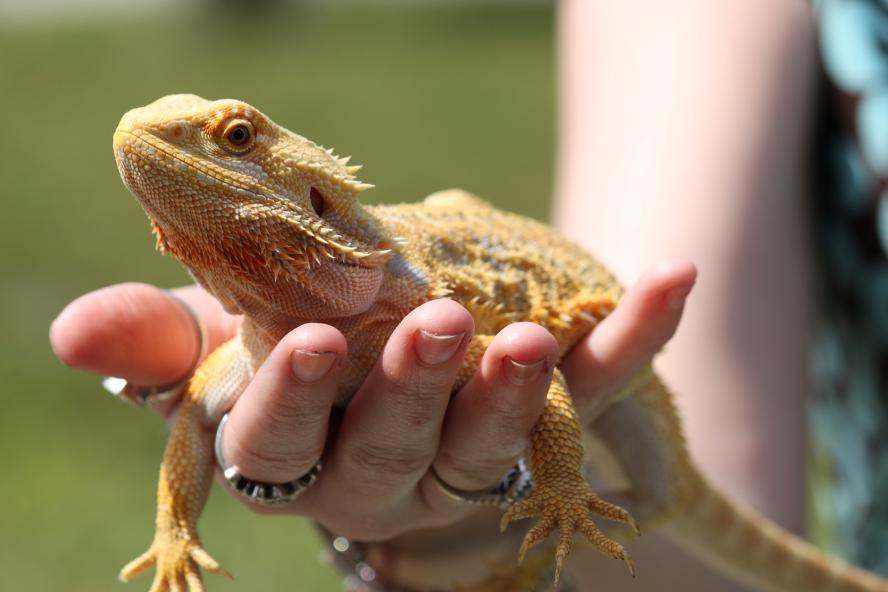-
About
- Leadership & Faculty
- News & Events
-
Academics
- Graduate
- Advanced Clinical Training
- Continuing Education
- Academic Departments
- Academic Offices
- Simulation Experiences
-
Student Life
- Offices
-
Research
-
Hospitals & Clinics
- Emergency Care
- Hospital Services
-
Community Outreach
- Volunteer
Feeding and Caring for Bearded Dragons
Research published by Cummings School professor shares insight into increasingly popular exotic pet

Two recently published articles about bearded dragons provide useful insights into their feeding practices and shed light on hepatic lipidosis, a common disease among the captive reptiles.
Lead author Trinita Barboza, D.V.M., DVSc, assistant professor of zoological companion animal medicine (ZCAM) at Cummings School of Veterinary Medicine at Tufts University, earned a D.V.M. from the Western College of Veterinary Medicine, University of Saskatchewan. After completing small animal, avian/exotic medicine, and wildlife internships, she completed a three-year American College of Zoological Medicine residency and a doctoral program at the University of Guelph (Ontario, Canada), where she wrote a thesis on fatty liver disease in bearded dragons.
Posted online in June 2022 ahead of its September 2022 print date, the Journal of Herpetological Medicine and Surgery from the Association of Reptile and Amphibian Veterinarians published “Survey of Feeding Practices and Supplement Use in Pet Inland Bearded Dragons of the United States and Canada,” by Barboza, Sarah K. Abood (former assistant professor of clinical studies, Ontario Veterinary College) and Hugues Beaufrère (associate professor, companion zoological medicine and surgery, University of California–Davis).
A national survey of bearded dragon dietary habits in North America, conducted while Barboza was attending the University of Guelph, found that approximately half of the 405 survey participants were feeding bearded dragons a diet with less than 50% plant material and more than 50% insects. This revealed a need for a set of clear nutritional guidelines to outline the type, quantity, and frequency of food items and supplements offered to best support the lives of bearded dragons.
“I was drawn to bearded dragon research because when I was an intern, we commonly saw these animals with non-specific signs and several cases had fat in their liver on imaging,” says Barboza. “There was no evidence-based guidance on how to help them, so I chose to pursue this topic during my doctoral program.”
According to a March 2021 Reptiles Magazine article, the bearded dragon is the most popular pet reptile, based on Google Trends research published by the German Centre for Integrative Biodiversity Research.
Barboza shared that Cummings School has treated 340 bearded dragons since 2014—an annual average of about 40. “We will be looking at the data this year to write an article about the most common causes for presentation and outcomes for bearded dragons that we see,” she says.
Barboza collaborated with Beaufrère, Drury Reavill (zoo/exotic pathology service), and Leonardo Susta (assistant professor of pathobiology, University of Guelph) on an article titled “Prevalence and risk factors of hepatic lipid changes in bearded dragons,” published by Veterinary Pathology in June 2022.
Their research revealed that there is minimal information in the literature available for the diagnosis, prevention, and treatment of hepatic lipidosis, a common disease of captive bearded dragons. This study analyzed nearly 600 postmortem cases at two North American institutions to determine the prevalence and epidemiological risk factors associated with hepatic lipid changes in bearded dragons.
Using the archived sections of liver, the severity of lipid change was analyzed for grade and severity while considering demographic data and concurrent diseases. Among those analyzed, adult females exhibited an increased grade and severity while other demographics and factors did not, suggesting that reproductively active female adult bearded dragons are mildly predisposed to increasing lipid changes.
“These publications are beginning to draw attention to an important topic in bearded dragons,” Barboza shares. “Additional publications on diagnosis and possible treatment are forthcoming. At Tufts, I am continuing this research to understand the pathophysiology of the disease.”
Did you know? Bearded dragons are illegal to own as pets in 19 states, but legal in Massachusetts and Rhode Island, among others.
Department:
Foster Hospital for Small Animals